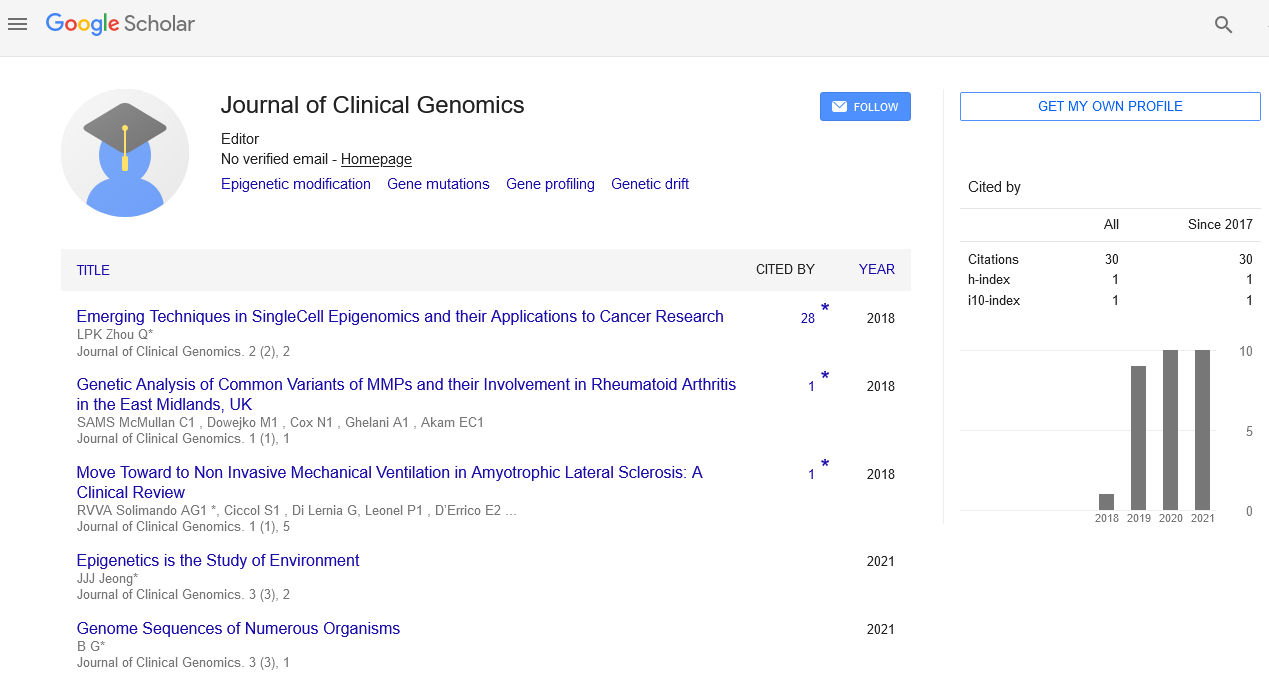Perspective, J Clin Genom Vol: 5 Issue: -2
Understanding the Mechanisms and Importance of Epigenetic Modifications
Zhang Kealohi*
Department of Respiratory Medicine, Xiangya Hospital, Central South University, Changsha, 410078, Hunan, China
*Corresponding Author: Zhang Kealohi
Department of Respiratory Medicine,
Xiangya Hospital, Central South University, Changsha, 410078, Hunan, China
E-mail: zhanlohi@csu.edu.cn
Received date: 03 February, 2023, Manuscript No. JCG-23-93393;
Editor assigned date: 07 February, 2023, PreQC No. JCG-23-93393 (PQ);
Reviewed date: 21 February, 2023, QC No. JCG-23-93393;
Revised date: 28 February, 2023, Manuscript No. JCG-23-93393 (R);
Published date: 07 March, 2023, DOI: 10.4172/JCG.1000116
Citation: Kealohi Z (2023) Understanding the Mechanisms and Importance of Epigenetic Modifications. J Clin Genom 5:1.
Description
Epigenetic modifications are chemical alterations to Deoxyribonucleic Acid (DNA) that do not change the underlying sequence but can alter gene expression. These modifications plays an important role in the development and function of all living organisms, from bacteria to humans. In recent years, research on epigenetics has expanded rapidly, leading to a better understanding of the mechanisms and importance of epigenetic modifications.
Epigenetic Modifications and Mechanisms
Epigenetic modifications
Epigenetic modifications can take many forms, including DNA methylation, histone modification, and Ribonucleic Acid (RNA) interference. DNA methylation is the most widely studied epigenetic modification and involves the addition of a methyl group to the cytosine base in DNA. This modification is associated with the repression of gene expression.
Histone modification: Histone modification involves the addition or removal of chemical groups to histone proteins, which are involved in packaging DNA into chromosomes. This modification can affect the accessibility of DNA to the transcription machinery and can either activate or repress gene expression.
RNA interference: RNA interference involves the use of small RNA molecules to regulate gene expression by either inhibiting translation or degrading target RNA molecules. This process can play a role in both the repression and activation of gene expression.
Importance of epigenetic modifications
Epigenetic modifications are essential for normal developmaenndt function in all organisms. These modifications play an important role in gene regulation, allowing cells to differentiate and specialize during development. In addition, epigenetic modifications can respond to environmental signals and play a role in the adaptation of organisms to changing conditions.
Epigenetic modifications also play a vital role in various diseases. Changes in DNA methylation and histone modification have been associated with a wide range of diseases, including cancer, cardiovascular disease, and neurological disorders. For example, abnormal DNA methylation patterns have been observed in many types of cancer, leading to changes in gene expression that can promote tumor growth.
Challenges in Epigenetics Research
Despite the progress that has been made in the field of epigenetics, there are still many challenges that researchers face. One of the biggest challenges is the complexity of epigenetic regulation. Epigenetic modifications can interact with each other and with other regulatory pathways, making it difficult to understand their precise effects on gene expression.
Another challenge is the difficulty in studying epigenetic modifications. Unlike genetic mutations, which can be detected by sequencing DNA, epigenetic modifications require specialized techniques to identify and analyze. In addition, the effects of epigenetic modifications can be context-dependent, making it challenging to study them in isolation.
Potential Applications of Epigenetics Research
Despite these challenges, the study of epigenetics has the potential to lead to significant advancements in the diagnosis and treatment of diseases. For example, researchers are working to develop epigenetic biomarkers that can be used to diagnose and monitor diseases. These biomarkers could allow for earlier diagnosis and more personalized treatment plans.
Researchers are studying how epigenetic modifications can be targeted for therapeutic purposes. For example, drugs that target enzymes involved in epigenetic modifications have shown promise in preclinical studies for the treatment of cancer.
Conclusion
The study of epigenetics is a rapidly evolving field that has the potential to lead to significant advancements in the diagnosis and treatment of diseases. While there are still many challenges to overcome, recent discoveries have provided new insights into the mechanisms and importance of epigenetic modifications. With continued research and innovation, it is hoped that the study of epigenetics will lead to improved outcomes for individuals affected by diseases.
 Spanish
Spanish  Chinese
Chinese  Russian
Russian  German
German  French
French  Japanese
Japanese  Portuguese
Portuguese  Hindi
Hindi 